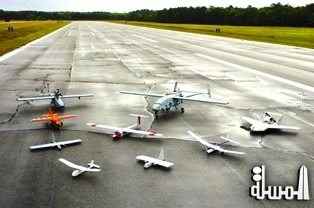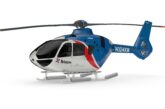
THE FUTURE OF UNMANNED AIRCRAFT SYSTEMS – KEY TOPICS FOR THE 2016 GLOBAL AEROSPACE SUMMIT
Abu Dhabi summit to discuss applications of unmanned, autonomous, and remotely piloted technology in the aviation sector
ATP- arab tourism portal- Abu Dhabi,- International aerospace experts will convene in Abu Dhabi at the third Global Aerospace Summit to discuss the rapidly changing role of Unmanned Aircraft Systems (UAS), popularly known as drones.
UAS are widely recognised by the industry as systems that can be programmed to automatically carry out specific operational missions, with a certain level of self-governance, under the control and guidance of a human-operator at mission level.
They are often seen as the next major step in the fusion of computing technologies, sensors, software, and mechanical systems. These mobile machines are able to travel by air, land, or sea, and potential applications range from humanitarian to ecological to military. UAS technologies are already being used in initial stages for package deliveries, film making, and other civilian applications, and are set to expand steadily in the coming years.
There is a vast array of autonomous systems available today that combine tasks such as detection, classification, sample gathering, mission preparation, surveillance, and others.

With a rapidly growing high-tech aerospace sector, the UAE stands to benefit from the expansion of civilian UAV use. A number of UAE governmental organizations are studying the integration of drones into their services. Although civilian UAV technology has been identified by the UAE government as a key area of focus for investment and research, its misuse has been identified as a major potential risk.
The Department of Economic Development in Abu Dhabi has banned the sale of commercial drones in a move to preserve aviation security and safety, as well as community privacy. The Dubai Civil Aviation Authority (DCAA) has made similar restrictions in a decree to manage the responsible use of drones, fireworks, lasers, and light beams issued by His Highness Sheikh Mohammed bin Rashid, UAE Vice President, Prime Minister, and Ruler of Dubai.
![]() In January 2015, an unidentified commercial drone caused a disruption in Dubai International Airport operations. Authorities halted air traffic at DXB for 55 minutes after detecting a flying drone in the navigation path of airplanes. Following this incident, UAE authorities called for new rules to be issued on the use of commercial drones.
In January 2015, an unidentified commercial drone caused a disruption in Dubai International Airport operations. Authorities halted air traffic at DXB for 55 minutes after detecting a flying drone in the navigation path of airplanes. Following this incident, UAE authorities called for new rules to be issued on the use of commercial drones.
The commercial and entertainment use of drones in the UAE now requires a permit to be obtained from the General Civil Aviation Authority (GCAA.)
Unmanned systems for military use can have important benefits such as enhanced performance, reduced cost and can also eliminate the risks that personnel may face during specialized missions. Being unmanned, they allow individuals to avoid perilous or risky situations, while accessing data or monitoring the mission from a safe location.
As an industry example, Textron Systems has been involved in unmanned aviation for decades, not just designing and manufacturing systems, but also training, deploying, operating, and maintaining them for military and commercial customers around the world.
Textron Systems supports its UAS customers with flexible business models to accommodate a range of customer needs. These include complete turnkey fee-for-service mission delivery, system sales, and a hybrid approach where the company trains new operators and maintainers— even while executing missions with its own experienced staff.
“The Global Aerospace Summit brings together thought leaders from the aerospace, aviation, defense and space industries, alongside key decision makers and officials,” says Senior Vice President and General Manager Bill Irby of Textron Systems. “Together, we are able to discuss advanced technologies and operational concepts on a global stage.”
UAE firms such as Adcom Systems, Abu Dhabi Autonomous Systems Investments (ADASI), and International Golden Group (IGG) are already building UAV operational and maintenance capabilities in ventures with firms from the United States, France, and Spain.
ADASI foresees a $4.5 billion UAV market over the period from 2014 to 2023 in the Middle East, representing about 10 percent of the global UAV market during that period.
Charlie Simpson, Director UAE, BAE Systems, said: “BAE Systems has long had an interest in the development and technologies associated with unmanned aircraft systems. Used appropriately these technologies have the potential to save lives when utilised for such things as coast guard operations, fighting forest fires and search and rescue missions.
“Key to this is the safe integration of UAS into all types of airspace. This can only be achieved by system developers working closely with the regulatory authorities to ensure that UAS safety levels are equivalent to those of manned systems, and their operation is transparent to all air users. Whilst these systems are now adopting high levels of automation, there is always a human in the loop to command systems and to communicate with Air Traffic Control.
“Key technologies and regulatory frameworks are being developed in the UK via our involvement in such initiatives as the ASTRAEA programme, which has already demonstrated maturing technologies such as “sense & avoid” and seeks to prove through a staged approach how unmanned aircraft systems could achieve routine airworthiness certification”.
The Global Aerospace Summit, an exclusive, invitation-only event for the international aerospace industry will identify and discuss the rapid changes in unmanned systems and their impact on the industry and the world.
The Global Aerospace Summit UAS panel sessions will discuss key challenges to the wider implementation of UAS and UAV technology in civilian applications. As planes increasingly fly without pilots, the industry leaders at the Global Aerospace Summit will discuss how governments, regulators, and industry can work together to solve challenges, as well as explore the incredible opportunities that UAS technology could offer in the future, including safer, faster, and more efficient commercial aviation travel. Other issues of Unmanned Aerial Systems include drafting appropriate regulations, air traffic management, and defense vs civilian use of technology.
The premier thought leadership forum for the aerospace industry will be held in Abu Dhabi on 7-8 March 2016.








